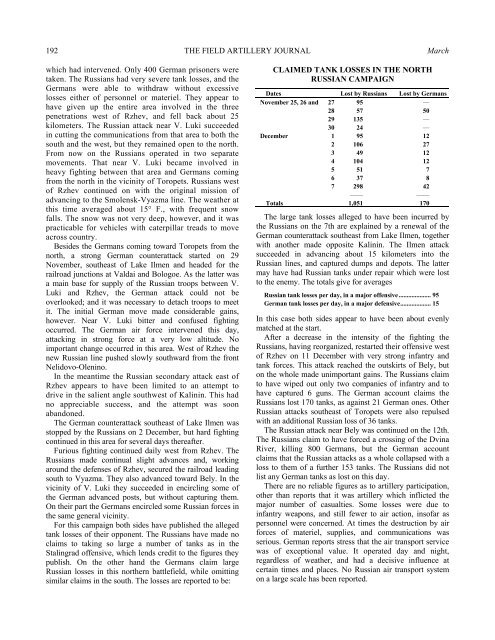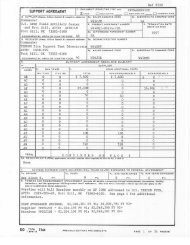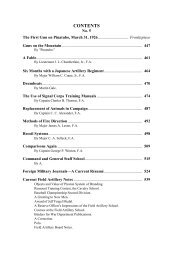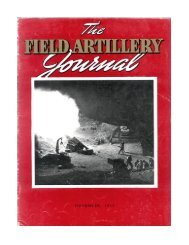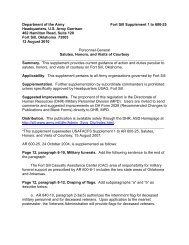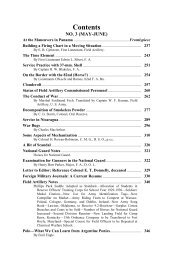the field artillery journal - Fort Sill - U.S. Army
the field artillery journal - Fort Sill - U.S. Army
the field artillery journal - Fort Sill - U.S. Army
Create successful ePaper yourself
Turn your PDF publications into a flip-book with our unique Google optimized e-Paper software.
192 THE FIELD ARTILLERY JOURNAL March<br />
which had intervened. Only 400 German prisoners were<br />
taken. The Russians had very severe tank losses, and <strong>the</strong><br />
Germans were able to withdraw without excessive<br />
losses ei<strong>the</strong>r of personnel or materiel. They appear to<br />
have given up <strong>the</strong> entire area involved in <strong>the</strong> three<br />
penetrations west of Rzhev, and fell back about 25<br />
kilometers. The Russian attack near V. Luki succeeded<br />
in cutting <strong>the</strong> communications from that area to both <strong>the</strong><br />
south and <strong>the</strong> west, but <strong>the</strong>y remained open to <strong>the</strong> north.<br />
From now on <strong>the</strong> Russians operated in two separate<br />
movements. That near V. Luki became involved in<br />
heavy fighting between that area and Germans coming<br />
from <strong>the</strong> north in <strong>the</strong> vicinity of Toropets. Russians west<br />
of Rzhev continued on with <strong>the</strong> original mission of<br />
advancing to <strong>the</strong> Smolensk-Vyazma line. The wea<strong>the</strong>r at<br />
this time averaged about 15° F., with frequent snow<br />
falls. The snow was not very deep, however, and it was<br />
practicable for vehicles with caterpillar treads to move<br />
across country.<br />
Besides <strong>the</strong> Germans coming toward Toropets from <strong>the</strong><br />
north, a strong German counterattack started on 29<br />
November, sou<strong>the</strong>ast of Lake Ilmen and headed for <strong>the</strong><br />
railroad junctions at Valdai and Bologoe. As <strong>the</strong> latter was<br />
a main base for supply of <strong>the</strong> Russian troops between V.<br />
Luki and Rzhev, <strong>the</strong> German attack could not be<br />
overlooked; and it was necessary to detach troops to meet<br />
it. The initial German move made considerable gains,<br />
however. Near V. Luki bitter and confused fighting<br />
occurred. The German air force intervened this day,<br />
attacking in strong force at a very low altitude. No<br />
important change occurred in this area. West of Rzhev <strong>the</strong><br />
new Russian line pushed slowly southward from <strong>the</strong> front<br />
Nelidovo-Olenino.<br />
In <strong>the</strong> meantime <strong>the</strong> Russian secondary attack east of<br />
Rzhev appears to have been limited to an attempt to<br />
drive in <strong>the</strong> salient angle southwest of Kalinin. This had<br />
no appreciable success, and <strong>the</strong> attempt was soon<br />
abandoned.<br />
The German counterattack sou<strong>the</strong>ast of Lake Ilmen was<br />
stopped by <strong>the</strong> Russians on 2 December, but hard fighting<br />
continued in this area for several days <strong>the</strong>reafter.<br />
Furious fighting continued daily west from Rzhev. The<br />
Russians made continual slight advances and, working<br />
around <strong>the</strong> defenses of Rzhev, secured <strong>the</strong> railroad leading<br />
south to Vyazma. They also advanced toward Bely. In <strong>the</strong><br />
vicinity of V. Luki <strong>the</strong>y succeeded in encircling some of<br />
<strong>the</strong> German advanced posts, but without capturing <strong>the</strong>m.<br />
On <strong>the</strong>ir part <strong>the</strong> Germans encircled some Russian forces in<br />
<strong>the</strong> same general vicinity.<br />
For this campaign both sides have published <strong>the</strong> alleged<br />
tank losses of <strong>the</strong>ir opponent. The Russians have made no<br />
claims to taking so large a number of tanks as in <strong>the</strong><br />
Stalingrad offensive, which lends credit to <strong>the</strong> figures <strong>the</strong>y<br />
publish. On <strong>the</strong> o<strong>the</strong>r hand <strong>the</strong> Germans claim large<br />
Russian losses in this nor<strong>the</strong>rn battle<strong>field</strong>, while omitting<br />
similar claims in <strong>the</strong> south. The losses are reported to be:<br />
CLAIMED TANK LOSSES IN THE NORTH<br />
RUSSIAN CAMPAIGN<br />
Dates Lost by Russians Lost by Germans<br />
November 25, 26 and 27 95 —<br />
28 57 50<br />
29 135 —<br />
30 24 —<br />
December 1 95 12<br />
2 106 27<br />
3 49 12<br />
4 104 12<br />
5 51 7<br />
6 37 8<br />
7 298 42<br />
—— ——<br />
Totals 1,051 170<br />
The large tank losses alleged to have been incurred by<br />
<strong>the</strong> Russians on <strong>the</strong> 7th are explained by a renewal of <strong>the</strong><br />
German counterattack sou<strong>the</strong>ast from Lake Ilmen, toge<strong>the</strong>r<br />
with ano<strong>the</strong>r made opposite Kalinin. The Ilmen attack<br />
succeeded in advancing about 15 kilometers into <strong>the</strong><br />
Russian lines, and captured dumps and depots. The latter<br />
may have had Russian tanks under repair which were lost<br />
to <strong>the</strong> enemy. The totals give for averages<br />
Russian tank losses per day, in a major offensive.................... 95<br />
German tank losses per day, in a major defensive................... 15<br />
In this case both sides appear to have been about evenly<br />
matched at <strong>the</strong> start.<br />
After a decrease in <strong>the</strong> intensity of <strong>the</strong> fighting <strong>the</strong><br />
Russians, having reorganized, restarted <strong>the</strong>ir offensive west<br />
of Rzhev on 11 December with very strong infantry and<br />
tank forces. This attack reached <strong>the</strong> outskirts of Bely, but<br />
on <strong>the</strong> whole made unimportant gains. The Russians claim<br />
to have wiped out only two companies of infantry and to<br />
have captured 6 guns. The German account claims <strong>the</strong><br />
Russians lost 170 tanks, as against 21 German ones. O<strong>the</strong>r<br />
Russian attacks sou<strong>the</strong>ast of Toropets were also repulsed<br />
with an additional Russian loss of 36 tanks.<br />
The Russian attack near Bely was continued on <strong>the</strong> 12th.<br />
The Russians claim to have forced a crossing of <strong>the</strong> Dvina<br />
River, killing 800 Germans, but <strong>the</strong> German account<br />
claims that <strong>the</strong> Russian attacks as a whole collapsed with a<br />
loss to <strong>the</strong>m of a fur<strong>the</strong>r 153 tanks. The Russians did not<br />
list any German tanks as lost on this day.<br />
There are no reliable figures as to <strong>artillery</strong> participation,<br />
o<strong>the</strong>r than reports that it was <strong>artillery</strong> which inflicted <strong>the</strong><br />
major number of casualties. Some losses were due to<br />
infantry weapons, and still fewer to air action, insofar as<br />
personnel were concerned. At times <strong>the</strong> destruction by air<br />
forces of materiel, supplies, and communications was<br />
serious. German reports stress that <strong>the</strong> air transport service<br />
was of exceptional value. It operated day and night,<br />
regardless of wea<strong>the</strong>r, and had a decisive influence at<br />
certain times and places. No Russian air transport system<br />
on a large scale has been reported.


